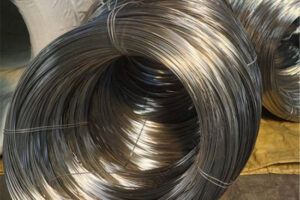Extension Spring Material – Choosing the Right Material for Your Extension Springs

Extension springs are a type of mechanical spring that is designed to resist stretching. They are commonly used in a wide range of applications, from appliances to automotive parts. Choosing the right material for your extension springs is essential to ensure that they perform optimally and have a long service life. In this article, we will discuss the different materials used for extension springs and their properties.
Materials for Extension Springs:
1. High Carbon Steel – This is the most commonly used material for extension springs. It is strong and durable, with a high tensile strength and good resistance to corrosion. However, it is not suitable for high-temperature applications.
2. Stainless Steel – Stainless steel is a popular choice for extension springs due to its excellent corrosion resistance and high-temperature tolerance. It is commonly used in marine and food processing industries.
3. Music Wire – Material Music wire is a high-carbon steel wire that is specially processed to have excellent spring properties for extension springs. It is commonly used in applications that require high strength and durability, such as guitar strings and mechanical springs.
4. Phosphor Bronze – Phosphor bronze is an alloy of copper and tin that is known for its excellent corrosion resistance and electrical conductivity. It is commonly used in applications that require a high degree of electrical conductivity, such as electrical contacts and switches.
5. Beryllium Copper – Beryllium copper is an alloy of copper and beryllium that is known for its high strength, durability, and electrical conductivity. It is commonly used in applications that require a high degree of electrical conductivity and strength, such as electrical connectors and switches.
Choosing the Right Material:
Choosing the right material for your extension springs depends on several factors, including the application, the environment, and the required properties. High carbon steel is a good choice for most applications, but if the springs will be exposed to high temperatures or corrosive environments, stainless steel or another material may be a better choice. Music wire is a good choice for applications that require high strength and durability, while phosphor bronze and beryllium copper are ideal for applications that require high electrical conductivity.
Conclusion:
In conclusion, choosing the right material for your extension springs is crucial to ensure that they perform optimally and have a long service life. High carbon steel, stainless steel, music wire, phosphor bronze, and beryllium copper are all excellent materials for tension springs, but the choice depends on the specific requirements of the application. By understanding the properties of each material, you can make an informed decision and select the right material for your springs.







